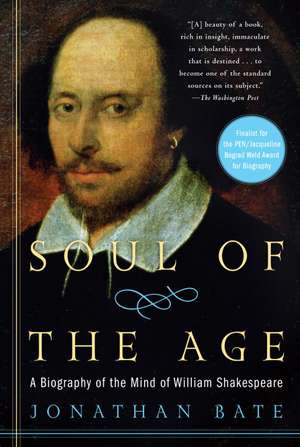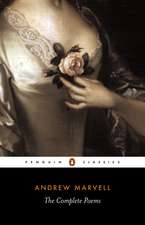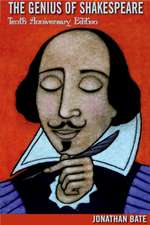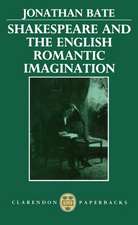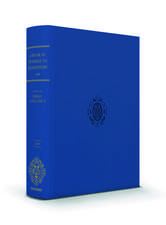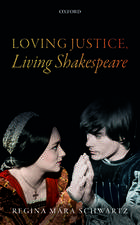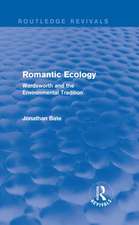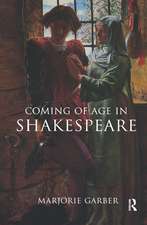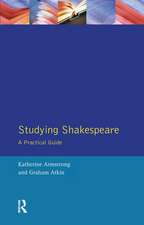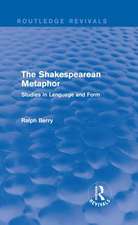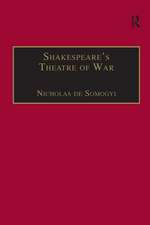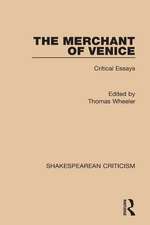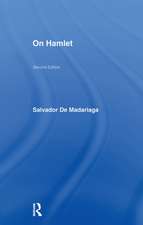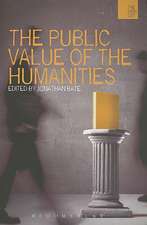Soul of the Age: A Biography of the Mind of William Shakespeare
Autor Jonathan Bateen Limba Engleză Paperback – 30 sep 2010
His acts being seven ages.”
In this illuminating, innovative biography, Jonathan Bate, one of today’s most accomplished Shakespearean scholars, has found a fascinating new way to tell the story of the great dramatist. Using the Bard’s own immortal list of a man’s seven ages in As You Like It, Bate deduces the crucial events of Shakespeare’s life and connects them to his world and work as never before.
Here is the author as an infant, born into a world of plague and syphillis, diseases with which he became closely familiar; as a schoolboy, a position he portrayed in The Merry Wives of Windsor, in which a clever, cheeky lad named William learns Latin grammar; as a lover, married at eighteen to an older woman already pregnant, perhaps presaging Bassanio, who in The Merchant of Venice won a wife who could save him from financial ruin. Here, too, is Shakespeare as a soldier, writing Henry the Fifth’s St. Crispin’s Day speech, with a nod to his own monarch Elizabeth I’s passionate addresses; as a justice, revealing his possible legal training in his precise use of the law in plays from Hamlet to Macbeth; and as a pantaloon, an early retiree because of, Bate postulates, either illness or a scandal. Finally, Shakespeare enters oblivion, with sonnets that suggest he actively sought immortality through his art and secretly helped shape his posthumous image more than anyone ever knew.
Equal parts masterly detective story, brilliant literary analysis, and insightful world history, Soul of the Age is more than a superb new recounting of Shakespeare’s experiences; it is a bold and entertaining work of scholarship and speculation, one that shifts from past to present, reality to the imagination, to reveal how this unsurpassed artist came to be.
From the Hardcover edition.
| Toate formatele și edițiile | Preț | Express |
|---|---|---|
| Paperback (2) | 83.31 lei 3-5 săpt. | +14.46 lei 5-11 zile |
| Penguin Books – 3 iun 2009 | 83.31 lei 3-5 săpt. | +14.46 lei 5-11 zile |
| Random House Trade – 30 sep 2010 | 139.87 lei 3-5 săpt. |
Preț: 139.87 lei
Nou
Puncte Express: 210
Preț estimativ în valută:
26.77€ • 29.09$ • 22.50£
26.77€ • 29.09$ • 22.50£
Carte disponibilă
Livrare economică 31 martie-14 aprilie
Preluare comenzi: 021 569.72.76
Specificații
ISBN-13: 9780812971811
ISBN-10: 0812971817
Pagini: 498
Ilustrații: 22 PHOTOS THROUGHOUT
Dimensiuni: 157 x 229 x 28 mm
Greutate: 0.52 kg
Editura: Random House Trade
ISBN-10: 0812971817
Pagini: 498
Ilustrații: 22 PHOTOS THROUGHOUT
Dimensiuni: 157 x 229 x 28 mm
Greutate: 0.52 kg
Editura: Random House Trade
Notă biografică
Jonathan Bate is a professor of Shakespeare and Renaissance literature at the University of Warwick. Widely known as a critic, award-winning biographer, and broadcaster, Bate is the author of several books on Shakespeare and principal editor of the Modern Library’s and Royal Shakespeare Company’s highly acclaimed William Shakespeare: Complete Works.
From the Hardcover edition.
From the Hardcover edition.
Extras
Chapter One
STRATFORD 1564
Here begins the plague
...
Exit pursued by a bear: antigonus is torn to pieces. a clownish young shepherd witnesses his death on land and many more losses on the sea as a tempest-tossed ship is swallowed by the waves. “A sad tale’s best for winter,” little Prince Mamillius has said, before being struck by death himself. But Shakespeare’s Winter’s Tale veers from tragedy to comedy. Young Shepherd’s breathless description of heavy matters is counterpointed against Old Shepherd’s amazed discovery of new life in the form of the abandoned baby Perdita. “Thou met’st with things dying,” he serenely remarks to his son, “I with things new born.”
In Shakespeare’s England, birth and death went cheek by jowl. Each entry in the parish register of Holy Trinity Church, Stratford-upon- Avon, is encoded with a single letter: C for christened, M for married, and B for buried. A ceaseless procession of birth, copulation, and death: human life stripped to its essentials. Shortly after the entry that reads “1564, Apr. 26. C. Gulielmus filius Johannes Shakspere”—April 26, 1564, christened, William, son of John Shakespeare—the entries marked B begin to thicken on the page. There were no more than twenty deaths in the first half of 1564, well over two hundred in the second. The population of this small but prosperous market town in the English Midland county of Warwickshire was about fifteen hundred, so more than one in seven were taken in those few months of devastation. The cause is duly noted in a marginal annotation opposite the burial entry for Oliver Gunne, apprentice: hic incepit pestis. Here begins the plague.
In August, the town council met in emergency session in the garden of the Gild Chapel, hoping that the outdoor air would be less contagious than that of the Gild Hall. They discussed relief for the plague victims. “Burgess” (councillor) John Shakespeare gave a generous sum of money. The horror faced by the townspeople may be glimpsed from a contemporary account of a plague outbreak in London. If just one member of a family was struck down, the rest would have been closed up in the house to prevent the spread of infection:
What an unmatchable torment were it for a man to be barred up every night in a vast silent charnel-house? Hung (to make it more hideous) with lamps dimly and slowly burning, in hollow and glimmering corners: where all the pavement should, instead of green rushes, be strewed with blasted rosemary, withered hyacinths, fatal cypress and yew, thickly mingled with heaps of dead men’s bones: the bare ribs of a father that begat him, lying there: here the chapless hollow skull of a mother that bore him.
The previous year, John and Mary Shakespeare had lost their infant Margaret at four months, and sometime before that, another girl, Joan. Cause of deaths unknown. But the loss not uncommon—everyone knew infant mortality.
They were doubly lucky this time. William was what every respectable couple wanted: a son to maintain the family name and estate. His sex was their first stroke of good fortune. Second was his survival of the plague. What John and Mary could never know was that he would not merely survive, but make the Shakespeare name live as long as humankind has books and stories.
Plague was the single most powerful force shaping his life and those of his contemporaries. John Stow’s annals of English history summarized the key events of the year of Shakespeare’s birth. The previous autumn, Londoners had suffered terribly: “Forsomuch as the plague of pestilence was so hot in the city of London, there was no term kept at Michaelmas: to be short, the poor citizens of London were this year plagued with a threefold plague, pestilence, scarcity of money, and dearth of victuals: the misery whereof, were too long here to write, no doubt the poor remember it, the rich by flight into the countries made shift for themselves.”
John Stow, denominated “Citizen of London” on his title page, would not have bothered to record an outbreak of plague in a small town in the Midlands. There is London and there is the rest of England. London is far bigger than every other conurbation. It is more densely populated, so the spread of plague is more rapid. And it is the location of the institutions that govern the nation: the royal court, the houses of Parliament and the law courts, Lambeth Palace (London residence of the archbishop of Canterbury and administrative headquarters of the Church of England). In bad times, the rich and their institutions could take flight to the country, leaving the London poor to shift for themselves. The royal court was supremely mobile, with the queen moving on a whim or a plague warning from Whitehall in central London to one of her other palaces—Greenwich downstream, Hampton Court upstream, Richmond or Windsor secluded in their deer parks, or Nonsuch deep in rural Surrey.
It was a litigious age. Stow measures the seasons by the four terms of the legal year, when the courts were in session. During times of plague, as in Michaelmas term (October to December) 1563 and Hilary term (January to March) 1564, the judges and lawyers met out of town. Throughout Shakespeare’s professional career, there were close links between the worlds of law and theater. Many of his fellow dramatists trained at the Inns of Court. Law students were a key element of the theater audience. Hack writer Tom Nashe railed against the “tedious dead vacation” when there were no lawyers to see his plays or buy his pamphlets. And, like the law courts, the acting companies traveled out of town when plague was severe.
So it was that plague determined several turning points in Shakespeare’s career. In January 1593, just as he was making his name as an actor turned playwright, an order went out from the Privy Council: “Forasmuch as by the certificate of the last week it appeareth the infection doth increase . . . we think it fit that all manner of concourse and public meetings of the people at plays, bear- baitings, bowlings and other like assemblies for sports be forbidden.” Save for a few weeks’ remission the following winter, the theaters remained closed for a year and a half. The actors toured, while a different Shakespeare emerged. The rewrite man, the patcher of old plays from the existing repertoire, turned himself into an original poet. In April 1593, he published “the first heir” of his “invention,” Venus and Adonis. Its stylistic brilliance and risqué content made his name among the smart set. It became the bestselling long poem of the age, the favored reading of undergraduates and Inns of Court men. Dedicated to Henry Wriothesley, the third earl of Southampton, it was also a bid for patronage.
The dedicatory epistle that begins the more serious and rhetorically elaborate follow-up poem, The Rape of Lucrece, published the next year, suggests that the bid was successful. Where Shakespeare’s letter prefacing Venus and Adonis dwells on his “hopeful expectation,” the one attached to Lucrece speaks repeatedly of “duty” and devoted service: “What I have done is yours, what I have to do is yours, being part in all I have, devoted yours.” There is a strong possibility that Shakespeare spent part of the plague year in some form of service in Southampton’s household at Titchfield in Hampshire.
The association with Southampton had three key consequences. It transformed Shakespeare from jobbing playwright to courtly poet, marked him out as the crossover man who could appeal equally to penny- paying groundlings and powerful courtiers or even the queen herself. Politically, it brought him into the orbit of the earl of Essex, to whom young Southampton was devoted. This would have potentially dangerous consequences a few years later. And intellectually, it introduced him to the work of the Anglo-Italian man of letters John Florio, Southampton’s tutor, through whom he was exposed to Italian culture and, later, the essays of Michel de Montaigne, whose subtle, sympathetic mind was perfectly attuned to his own.
The plague of 1593–94 provided an enforced sabbatical after which Shakespeare returned to the theater with a new-minted verbal art. In the next couple of years, he wrote the plays in which his literary style truly matures: the dazzlingly intellectual (Florioesque) Love’s Labour’s Lost, the miraculously imaginative Midsummer Night’s Dream, and the quicksilver Romeo and Juliet, with its growth from love’s artifice to the heart’s authenticity. When Mercutio dies with the words “A plague o’ both your houses,” it is no idle oath: the play was written in the aftermath of a period when the households of many members of Shakespeare’s London audience would have been struck by plague. And plague is indeed subtly woven into the plot: the reason Romeo does not get Friar Laurence’s crucial letter is that Friar John is detained for fear that he might have been infected. Parents are supposed to die before their children, the old before the young. With plague, it is not always like that. The tragic irony of Romeo and Juliet is that the houses of both Capulet and Montague escape the plague, yet still the children die first. The final scene takes place in an ancestral tomb, but those who lie dead are the flower of a city’s youth—Mercutio, Tybalt, Paris, Juliet, and her Romeo.
Plague also shapes the deep structure of Shakespeare’s imaginative world. As Queen Elizabeth secluded herself from infection at Richmond and Nonsuch, so Ferdinand King of Navarre and his courtiers in Love’s Labour’s Lost enclose themselves in a garden world. As A Midsummer Night’s Dream counterpoints city and court (Athens) against green world and fairy lore (the wood), so Shakespeare always moved between two worlds: London for business and busy-ness, Stratford for home and rest. The classical poet Horace made a distinction between negotium (social, mercantile, legal, and political transactions, the pursuit of wealth and power), always associated with the great city of Rome, and otium (peace, pastoral idleness), found on his country farm. Whenever asked “business or pleasure?” we are inheritors of that Horatian choice. Pleasure is otium, business its opposite (the word negotium is derived from otium and the prefix nec, “not”). Like a second Rome, London was synonymous with negotium, while the quiet town on the edge of the Forest of Arden represented otium. Shakespeare knew all about the dialectic of Horace’s two worlds from his reading in generations of pastoral literature, but he also lived the difference every time he walked or rode from his rented lodgings in London to his own home in Stratford. Plague was a key factor in determining the frequency of those journeys.
Mewling and puking
...
Even if you grow up to become the greatest writer the world has ever seen, you begin like every other baby, mewling and puking. When William Shakespeare was born in April 1564, he doubtless mewled because he had come into the world that he would one day call “this great stage of fools.” But in whose arms? Jaques addresses his “seven ages” speech to a group of courtiers. In their world, a baby would have been passed straight to a wet nurse, so it is dramatically appropriate that the infant is imagined mewling and puking in the nurse’s arms, not a mother’s. Shakespeare’s mother, Mary, claimed kinship with the illustrious Warwickshire family of Arden, but is unlikely to have been in the position to hire a wet nurse. Twenty years later, Shakespeare’s wife, Anne, would breast-feed her own daughter.
But perhaps we should not attach too much significance to the choice of nurse as opposed to mother. Nurse could simply mean “nourisher.” Shakespeare may have been the first person to take the word out of the nursery and use it in its modern sense, to apply it to general health care as opposed to the specific context of rearing an infant. In The Comedy of Errors, when the confusion created by the unrecognized presence of two sets of identical twins becomes so intense that Antipholus of Ephesus is supposed to have gone mad, his wife, Adriana, says
I will attend my husband, be his nurse,Diet his sickness, for it is my office,And will have no attorney but myself,And therefore let me have him home with me.
The juxtaposition of “nurse,” usually associated with mothers and infants, and “attorney,” a word belonging to the grown-up male world of the legal profession (“And then the justice . . .”), is typical of Shakespeare’s mingling of both “the ages of man” and the customary roles of men and women.
There aren’t many babies in the plays. In tragedy and history, we hear whispers of sterility and infanticide. Richard III has no compunction in ordering the murder of the princes in the Tower, King Lear curses the womb of his eldest daughter, Goneril, and Macbeth is tormented by the fact that he has no children to inherit his crown, while his wife talks of plucking her nipple from a baby’s boneless gums and dashing its brains out. Given that she is a lady and a future queen of Scotland, the image of her doing her own breast-feeding, rather than relying on a wet nurse, is an additional startling detail to set beside the violence.
The few babies that do appear—prop dolls, one assumes—are given a hard time. When Paulina in The Winter’s Tale brings Leontes his newborn daughter, she describes in beautiful detail how a baby appears to be a miniaturized “print” of its parent:
Behold, my lords,Although the print be little, the whole matterAnd copy of the father: eye, nose, lip,The trick of’s frown, his forehead, nay, the valley,The pretty dimples of his chin and cheek, his smiles,The very mould and frame of hand, nail, finger.
But Leontes is convinced his wife has been unfaithful to him:
This brat is none of mine.It is the issue of Polixenes.Hence with it, and together with the damCommit them to the fire!
Paulina’s husband saves the baby and takes her to the wilds of Polixenes’ own kingdom of Bohemia. For his pains, he exits where we began—pursued by a bear, leaving the baby, named Perdita, “the lost one,” to be found by the shepherds, raised as a shepherdess, and theatrically transformed back to the princess she was born to be.
In the bloody Roman play Titus Andronicus, it looks for a moment as though the black baby born of the clandestine affair between villainous Aaron the Moor and Tamora, queen of Goths and empress of Rome, will also be dispatched at birth. “The empress sends it thee, thy stamp, thy seal, / And bids thee christen it with thy dagger’s point.” But Aaron turns on the Nurse: “Zounds, you whore! Is black so base a hue?” The baby’s half brother offers to “broach the tadpole on my rapier’s point,” but Aaron stabs the Nurse instead: “Go to the empress, tell her this I said: [Stabs] / Weke, weke! So cries a pig preparèd to th’ spit.” He saves his baby and leaves the city of Rome.
A little while later, an army of Goths is marching toward Rome. Being cast as the Second Goth Soldier in Titus Andronicus is probably not the summit of any actor’s ambition, but Shakespeare has a way of giving life even to bit parts. This chap seems to have a taste for architectural ruins. One imagines him touring the shires with bicycle clips and a battered copy of Pevsner’s Buildings of England.
Renownèd Lucius, from our troops I strayedTo gaze upon a ruinous monastery,And as I earnestly did fix mine eyeUpon the wasted building, suddenlyI heard a child cry underneath a wall.
It is Aaron’s baby. But what is a ruined monastery doing in a play set in ancient Rome? And why is it that a few lines later Aaron himself speaks of “popish tricks and ceremonies”? Shakespeare is full of intentional anachronisms whereby the past illuminates the present and vice versa. In the blink of an eye we have been transported from the ancient Roman empire to the modern Roman Catholic Church, from an imagined Italy to the landscape of Shakespeare’s own time, an England of “bare ruined choirs where late the sweet birds sang.”
For defacing images
...
Winter 1563. Mary Shakespeare, born Mary Arden in the village of Wilmcote on the fringes of the Forest of Arden, is pregnant for the third time. John Shakespeare, her husband, is a busy man. His father had farmed in the village of Snitterfield, but he has moved into the town of Stratford-upon-Avon. His glove business is going well. He deals in wool on the side. And he is making an impression in local government. First he was the town’s ale taster or “conner,” assisting at the leet court where people went to complain about false measures and watered ale. He weighed the bread and tasted the beer, ensuring the brew was good and wholesome. Next he became constable. Then “affeeror,” whose business it was to levy fines in the local court. And then burgess, borough councillor. Now that Mary is pregnant with William, he is chamberlain, keeping the town’s accounts.
That winter, he and his fellow chamberlain John Taylor, shearman of Sheep Street, add a new entry: “Item, payd for defasyng ymages in ye chappell—ijs.” Two shillings, worth a dozen loaves of bread or a bottle of French wine or forty-eight tankards of ale (or, a generation later, twenty-four standing spaces to watch a play at the Globe), paid for the defacing of images in the chapel next door to the school on the corner of Church Street and Dead Lane.
The Gild of the Holy Cross had been at the heart of Stratford life for three hundred years. Its members, both men and women, pledged to keep fraternal relations, to attend one another’s funerals in Augustinian hoods, and to make payments for the souls of the dead, whose masses were sung by priests in the chapel. The guild had maintained the free school and almshouses for the poor.
Following the Protestant revolution, purgatory was abolished and prayers for the dead became redundant. The dead were either blessed and safe in heaven or damned and burning in hell, and that was that. And did not the Bible condemn graven images as idolatrous? The walls of the Gild Chapel had been covered in frescoes—there you could see St. George and the dragon; the murder of Thomas Becket; local saints and English heroes; and, above the arch of the nave, a great cross, the risen Christ, and the Last Judgment, showing the souls of the saved on their way to heaven, the devil and the Seven Deadly Sins taking the damned to the other place, marching them via the primrose path of dalliance to the everlasting bonfire.
With a bucket of whitewash, and a two-shilling bill to follow, workmen covered over all these images, obliterating the signs of a shared faith and folk memory. A few months later, Chamberlain Shakespeare’s first son would be born into a new world, a new dispensation. But the wash of lime blanking out the old world was a thin layer. Scratch away at the surface and the old ways are still visible. Always between two worlds he would be, this poet of double vision.
William Shakespeare grew up to become the father of twins and a dramatist who mingled comedy and tragedy, low life and high, prose and verse. He was a countryman who worked in the city, a teller of English folktales who was equally versed in the mythology of ancient Greece and Rome. His mind and world were poised between Catholicism and Protestantism, old feudal ways and new bourgeois ambitions, rational thinking and visceral instinct, faith and scepticism.
After the plague, the Reformation is the second great shadow cast across the moment of Shakespeare’s infancy. He lived between the two great cataclysms in English history: the break from the universal Roman Catholic Church and the execution of King Charles I. His plays were made possible by the first and helped to create the conditions that brought about the second.
For centuries, the staple of English drama had been the cycles known as miracle or mystery plays, dramatizations of biblical stories organized by the guilds of tradesmen in the major towns and cities around the country. They were destroyed by the Protestant Reformation. In 1532, within months of King Henry VIII’s defiance of the Vatican over his divorce from Catherine of Aragon, references to loyalty to the pope were removed from the proclamation of the Chester cycle. In the 1540s, during the reign of the boy king Edward VI, when hard-line Protestantism was established in England for the first time, the Mary plays were omitted from the York cycle, and the Feast of Corpus Christi, traditional occasion for the performances of the cycles, was suppressed. Protestant theology not only abhorred Catholic veneration of the Virgin Mary and the saints, but regarded the very act of representing God as a form of idolatry. As the frescoes were whitewashed in the Stratford Gild Chapel and the heads knocked off statues in churches across the land, so the Chester plays were performed for the last time in 1575. The following year the Diocesan Court of York banned the “counterfeit or representation” of any part of the Trinity or the sacraments of baptism or the Lord’s Supper or anything tending to “maintenance of superstition or idolatry.” Young Shakespeare might have caught a glimpse of ranting Herod in one of the last performances of the Coventry plays, which annually until 1579 brought thousands of spectators from across the region into Coventry on the feast of Corpus Christi. But by the time he began writing plays himself, the old religious drama was dead and buried.
From the Hardcover edition.
Recenzii
“Enthralling, the most eloquent evocation of Shakespeare one is ever likely to encounter.”—Times Literary Supplement, U.K.
“It is almost impossible to write something fresh about William Shakespeare. Yet Jonathan Bate has succeeded, with a sparkling and arresting portrait of the Bard and his world as discovered in his writings.”—The Economist (named one of the best books of 2008)
“Thoughtful, well-researched and even playful . . . An excellent resource for students of English literature and the Elizabethan era.”—Publishers Weekly
“Soul of the Age is the most artful, intriguing, and satisfying study of the mind of William Shakespeare we now possess. No other biography has used Shakespeare’s works so resourcefully to shed light on his life; few have so successfully mined the records of his life to illuminate the works. Each chapter shines with new discoveries, original insights, and dazzling prose. This is a major achievement from a master of Shakespeare studies.”—David Armitage, Lloyd C. Blankfein Professor of History, Harvard University
“Surprising, fresh and anything but le pot rechauffé . . . [Bate] has the gift of a true teacher–able at once to educate and to entertain. . . . After reading Soul of the Age I felt closer to the soul of Shakespeare.”—The Guardian,U.K.
“There can only be a handful of people in the world who know as much about Shakespeare as Bate, and it is intensely enjoyable to watch him bringing his knowledge to bear. He has the conjuror’s art of suspense, and you find yourself gasping with pleasure at the neatness of his conclusions. Few books pack so much new thinking about Shakespeare between their covers.”—Sunday Times, U.K.
“Bate is both a considerable scholar and an excellent writer, and he achieves a resonant and complex portrait, constantly alert to new lines of enquiry and unexpected connections. . . . [This] is a triumph of precision, learning and intelligent innovation.”—The Telegraph, U.K.
From the Hardcover edition.
“It is almost impossible to write something fresh about William Shakespeare. Yet Jonathan Bate has succeeded, with a sparkling and arresting portrait of the Bard and his world as discovered in his writings.”—The Economist (named one of the best books of 2008)
“Thoughtful, well-researched and even playful . . . An excellent resource for students of English literature and the Elizabethan era.”—Publishers Weekly
“Soul of the Age is the most artful, intriguing, and satisfying study of the mind of William Shakespeare we now possess. No other biography has used Shakespeare’s works so resourcefully to shed light on his life; few have so successfully mined the records of his life to illuminate the works. Each chapter shines with new discoveries, original insights, and dazzling prose. This is a major achievement from a master of Shakespeare studies.”—David Armitage, Lloyd C. Blankfein Professor of History, Harvard University
“Surprising, fresh and anything but le pot rechauffé . . . [Bate] has the gift of a true teacher–able at once to educate and to entertain. . . . After reading Soul of the Age I felt closer to the soul of Shakespeare.”—The Guardian,U.K.
“There can only be a handful of people in the world who know as much about Shakespeare as Bate, and it is intensely enjoyable to watch him bringing his knowledge to bear. He has the conjuror’s art of suspense, and you find yourself gasping with pleasure at the neatness of his conclusions. Few books pack so much new thinking about Shakespeare between their covers.”—Sunday Times, U.K.
“Bate is both a considerable scholar and an excellent writer, and he achieves a resonant and complex portrait, constantly alert to new lines of enquiry and unexpected connections. . . . [This] is a triumph of precision, learning and intelligent innovation.”—The Telegraph, U.K.
From the Hardcover edition.
